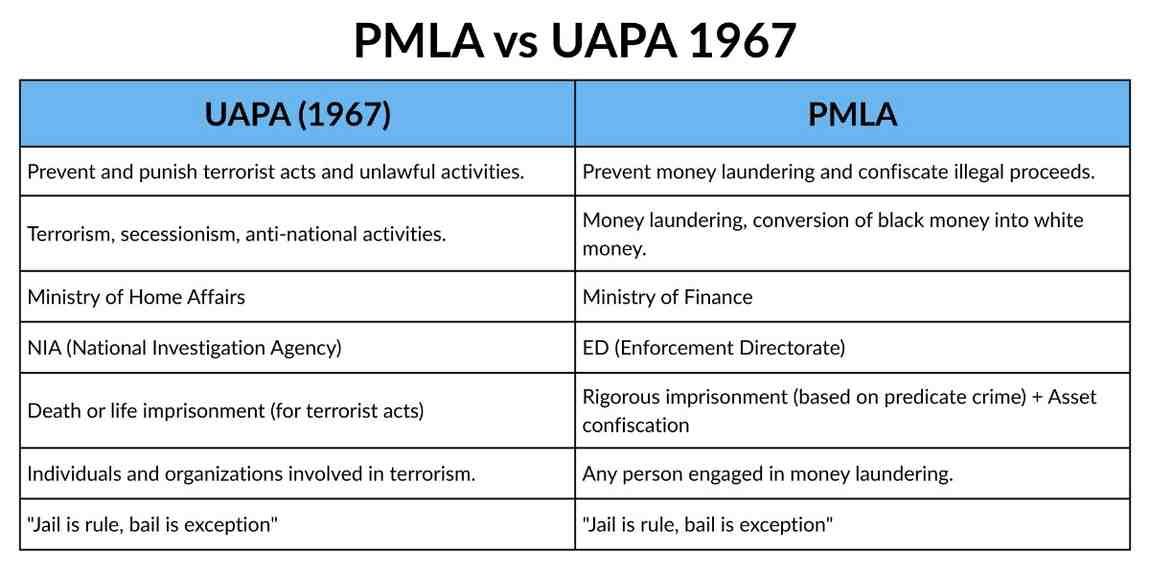Unlawful Activities (Prevention) Act, 1967 (UAPA): History, Provisions, Amendment | UPSC Notes
Nov, 2025
•4 min read
Why in the News?
UAPA is in the news as courts hear major cases, including Delhi riot bail pleas and recent ISIS-linked arrests, raising fresh concerns about balancing security needs with people’s rights and freedoms.
Why Cover This Topic for UPSC?
- Important for Prelims & Current Affairs
- Relevant for GS paper II (Polity and Governance).
- Relevant for Ethics Paper
- Relevant for Essay Topics (Governance and Policy Analysis)
What is UAPA 1967?
The Unlawful Activities (Prevention) Act, 1967, is India’s key anti-terrorism law. It was created to prevent unlawful activities carried out by individuals or groups that can harm India’s sovereignty and territorial integrity.
- The act was enacted on December 30, 1967, under the Ministry of Home Affairs.
- It was originally designed to tackle anti-national activities and secessionist movements after the Naxalbari peasants' uprising.
- It was extended to the whole of India and applies to both Indian and foreign nationals.
- It imposes the death penalty and life imprisonment as the highest punishments.
- It has replaced previous anti-terror laws like TADA (1987) and POTA (2002).
- Under the act, an individual can be detained for up to 180 days without formal charges; bail is extremely difficult to obtain.
Also read: Armed Forces Special Powers Act 1958 (AFSPA): UPSC Notes
Objectives of UAPA 1967
The Act was enacted to strengthen India's internal security framework and prevent activities that threaten the nation's unity and integrity.
- To provide effective prevention of unlawful activities of individuals and associations that support secessionism, communalism, and extremism.
- To deal with terrorist activities by defining and punishing offences related to terrorism, including raising funds, conspiring, recruiting, and harbouring terrorists.
- To ban associations and organisations involved in or supporting terrorism by declaring them as unlawful or terrorist entities.
- To forfeit the proceeds of terrorism and any property intended to be used for terrorist activities.
- To implement international commitments made at the Financial Action Task Force to combat money laundering and terrorism financing.
- To provide powers to freeze, seize or attach funds and financial assets of individuals or entities engaged in terrorism.
Also read: Money Laundering UPSC Notes: Meaning, Process, Laws, and Measures
Historical Background of UAPA
The evolution of UAPA reflects India's response to changing internal security threats over the decades.
- The term "unlawful association" originated in the Criminal Law Amendment Act, 1908, used to criminalise the Indian national independence movement.
- The Constitution (Sixteenth Amendment) Act, 1963, was enacted on the recommendation of the Committee on National Integration.
- This constitutional amendment empowered Parliament to impose reasonable restrictions on Article 19 (Freedom of Speech and Expression) for dealing with activities directed against the sovereignty and integrity of India.
- UAPA was consequently enacted in 1967 under Prime Minister Indira Gandhi's government.
- Before 2004, terrorist activities were dealt with under TADA (Terrorist and Disruptive Activities Prevention Act, 1987), which lapsed in 1995.
- POTA (Prevention of Terrorism Act, 2002) was enacted but repealed in 2004 due to widespread human rights violations and misuse.
- Until 2004, UAPA was not an anti-terror law and primarily focused on unlawful activities.
- The Supreme Court in Kartar Singh v State of Punjab upheld the validity of TADA, stating that serious threats fell within the Union's domain relating to national defence.
Also read: Article 21 UPSC Notes: Protection of Life and Personal Liberty | UPSC Polity Fundamental Rights
Major Provisions of UAPA 1967
The act contains comprehensive provisions to address terrorism and other unlawful activities that threaten national security.
- Definition of Unlawful Activity: Any action intended to bring about cession or secession of a part of the territory of India from the Union, or which disclaims, questions or disrupts the sovereignty and territorial integrity of India, or causes disaffection against India.
- Definition of Terrorist Act (Section 15): Whoever does any act with the intent to threaten the unity, integrity, security, or economic security of India or to strike terror in people by using bombs, explosives, firearms, or other lethal weapons, causing death, injury, or damage to property.
- Banning Organisations (Section 3): The Central or State Government can declare any association as unlawful by notification in the Official Gazette.
- Punishment for Terrorist Act (Section 16): Death penalty or life imprisonment if the terrorist act results in the death of any person.
- Punishment for Raising Funds (Section 17): Punishment for raising funds for terrorist acts from both legitimate and illegitimate sources.
- Punishment for Conspiracy (Section 18): Punishment for conspiring to commit terrorist acts.
- Punishment for Membership (Section 10, 20): Being a member of an unlawful or terrorist organisation is punishable.
- Punishment for Harbouring (Section 19): Punishment for harbouring or concealing terrorists.
- Bail Restrictions (Section 43D(5)): No bail can be granted if there are reasonable grounds for believing that the accusation against the person is prima facie true.
- Extended Detention: Allows detention without charge for up to 180 days, including up to 30 days in police custody.
- Seizure of Property (Section 51A): The Central Government has the power to freeze, seize or attach funds and financial assets of individuals or entities engaged in terrorism.
- Tribunal: Constituted under Section 5 by a sitting or retired High Court judge to review government notifications declaring organisations as unlawful.
Also read: FATF (Financial Action Task Force): Definition, Objectives, Functions & Key Facts for UPSC
Important Amendments in UAPA
The act has undergone significant amendments to address evolving security challenges and international commitments.
2004 Amendment:
- Chapter IV on "Punishment for Terrorist Activities" was added after POTA was repealed.
- The definition of "terrorist act" was introduced under Section 15.
- Power given to the government to designate organisations as terrorist entities.
- The schedule of terrorist organisations was added.
2008 Amendment:
- Enacted in the aftermath of the 26/11 Mumbai terror attacks
- Expanded definition of "terrorist act" to include acts that are intended to threaten or strike terror in India or outside.
- Added "economic security" to the definition of a terrorist act
- Section 43D(5) on bail was introduced, requiring denial of bail if there are reasonable grounds for believing that the accusation is prima facie true.
- Increased investigation powers and extended detention periods.
2013 Amendment:
- Brought UAPA in line with the requirements of the Financial Action Task Force (FATF).
- Enlarged the scope of "proceeds of terrorism" to include any property intended to be used for terrorism.
- Enlarged scope of Section 17 relating to punishment for raising funds for terrorist acts.
- Included offences by companies, societies or trusts within its scope.
2019 Amendment:
- The most controversial amendment was passed after the Pulwama terror attack.
- Power given to the Central Government to designate individuals as terrorists (previously, only organisations could be designated).
- Names of designated individuals added to the Fourth Schedule of the Act.
- The NIA Director General is empowered to approve the seizure of properties connected with terrorism.
- NIA officers of the rank of Inspector and above can investigate cases (previously only Deputy Superintendent or above).
- International Convention for Suppression of Acts of Nuclear Terrorism (2005) was added to the schedule of treaties.
UPSC Prelims MCQ on UAPA 1967
QUESTION 1
Easy
Indian Polity
With reference to the Unlawful Activities (Prevention) Act (UAPA), 1967, consider the following statements:
- The Act extends to the whole of India.
- It provides for both Indian and foreign nationals to be charged for unlawful activities.
- The highest punishment under UAPA is life imprisonment, but not death penalty.
Which of the statements above are correct?
Select an option to attempt
Landmark UAPA 1967 Judgments
The Supreme Court has delivered several landmark judgments interpreting UAPA provisions and balancing security with civil liberties.
- Union of India v. K.A. Najeeb (2021): SC said Section 43D(5) isn’t the only rule for bail; courts can grant bail if the right to speedy trial is violated.
- National Investigation Agency v. Zahoor Ahmad Shah Watali: Established that normal bail standards don't apply to UAPA cases, and Section 43D(5) restrictions must be followed.
- Mohammed Asarudeen vs. Union of India (May 2025): The Supreme Court ruled that courts cannot issue blanket orders to block the disclosure of witness statements in UAPA cases.

Criticisms of UAPA 1967
Despite its role in combating terrorism, UAPA has faced significant criticism from human rights organisations, international bodies, legal experts, and civil society.
- "Unlawful activity" and "terrorist act" are too broad, allowing criminalisation of legitimate dissent and protest.
- "Jail is the rule, bail is the exception", makes bail extremely difficult even for weak cases.
- Allows 5-7 years pre-trial detention without formal charges, violating Article 21 right to life.
- Allows detention up to 180 days without formal charges, violating Article 21 right to life and personal liberty.
- The 2019 amendment allows the government to designate individuals as terrorists without trial or judicial process.
- UN and human rights groups express concern that UAPA silences critics, journalists, and civil society activists.
- Terrorist designation process lacks transparency; the accused have no right to representation or evidence disclosure.
- NIA can investigate and arrest without state permission; minimal judicial checks on discretion.
UPSC Mains PYQ on UAPA 1967
The Indian Government has recently strengthened the anti-terrorism laws by amending the Unlawful Activities (Prevention) Act (UAPA), 1967 and the NIA Act. Analyse the changes in the context of the prevailing security environment while discussing the scope and reasons for opposing the UAPA by human rights organisations. (2019)
Evaluate Your Answer Now!Way Forward
A balanced approach is needed to ensure UAPA serves its purpose without compromising fundamental rights and democratic values.
- High Courts should set mandatory timelines, 90 days for a chargesheet, 2 years for trial completion.
- Automatic bail if the investigation is delayed beyond a reasonable time.
- Respect federal structure; state police handle local cases.
- Publish reasons for the individual/organisation's ban to allow legal challenge.
Unlock your UPSC Success with SuperKalam
Get instant doubt clearance, customised study plans, unlimited MCQ practice, and fast Mains answer feedback.
Join thousands of aspirants learning with India’s AI-powered mentor today!


